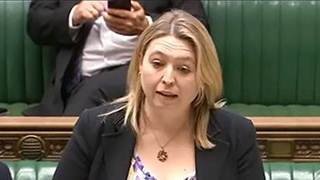Parliamentary committee reveals muddled thinking in 'counter-extremism' plans

A Home Office minister has admitted, to a leading Parliamentary committee, that the government's use of broad definitions in its 'Counter-Extremism Strategy' may have unintended consequences.
Karen Bradley MP made the revelations as she appeared before the Joint Committee on Human Rights, on Wednesday 29 June.
Christian Concern's Chief Executive, Andrea Williams, has previously warned that the definition of extremism in the proposals is "dangerously vague and open-ended". This warning appears in Christian Concern's free resource on the strategy, which highlights some of the threats posed to Christian freedoms.
Ms Bradley also repeatedly announced plans for a full public consultation on all aspects of the strategy, but failed to give any further details.
Muddled thinking
Instead, she highlighted the government's muddled thinking on the strategy. When questioned by the Committee on the definition of extremism she gave a range of different answers, including:
- the public promotion of an ideology which can lead to greater harms
- the preaching of an ideology that does lead to some sort of crime, or hatred or division in society
- the public promotion of an ideology that leads to harmful criminal behaviour
She claims that the government's 'Counter-Extremism Strategy' needs to have broad definitions in order to anticipate future forms of extremism.
'Broad, nebulous and subjective'
Karen Buck MP suggested that a lack of definitions in the consultation would render it "meaningless", and said the government's intentions are "broad, nebulous and subjective".
Harriet Harman MP, who chairs the Committee, pointed out that the current definitions are so wide, she too would be included as being extremist, for being intolerant of homophobic beliefs.
Jeremy Lefroy MP echoed those sentiments, saying: "I could quote any number of verses from the Bible or Qur'an which could easily be seen as inciteful."
Sunday schools
Further on, in the debate, Ms Bradley confirmed that the government will proceed with plans to inspect 'out-of-school settings'.
An 'out-of-school setting' is any setting which provides "intensive tuition" for more than six to eight hours a week. Sunday schools and other church youth groups could be included.
She stated that the government had plans to introduce a measure that would allow Ofsted to inspect these settings at their discretion if there are any "reported concerns".
During a parliamentary debate in January MPs expressed overwhelming opposition to the plans, calling them "illiberal", "statist", and a "mess".
Ms Bradley seemed to acknowledge these concerns, saying she didn't want to impinge on any civil rights or religious freedoms.
Related Links:
Minister questioned on Counter Extremism Bill (Parliament)
Government's 'out-of-school' settings plans 'illiberal' and 'statist', say MPs
Christian charities urge opposition to government plans for registration and inspection of church youth work
Prime Minister describes use of Prevent to ban Christian meetings as 'ludicrous'
